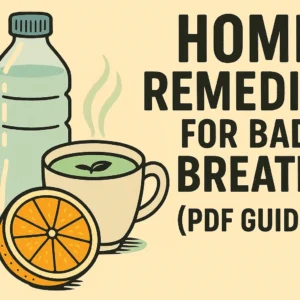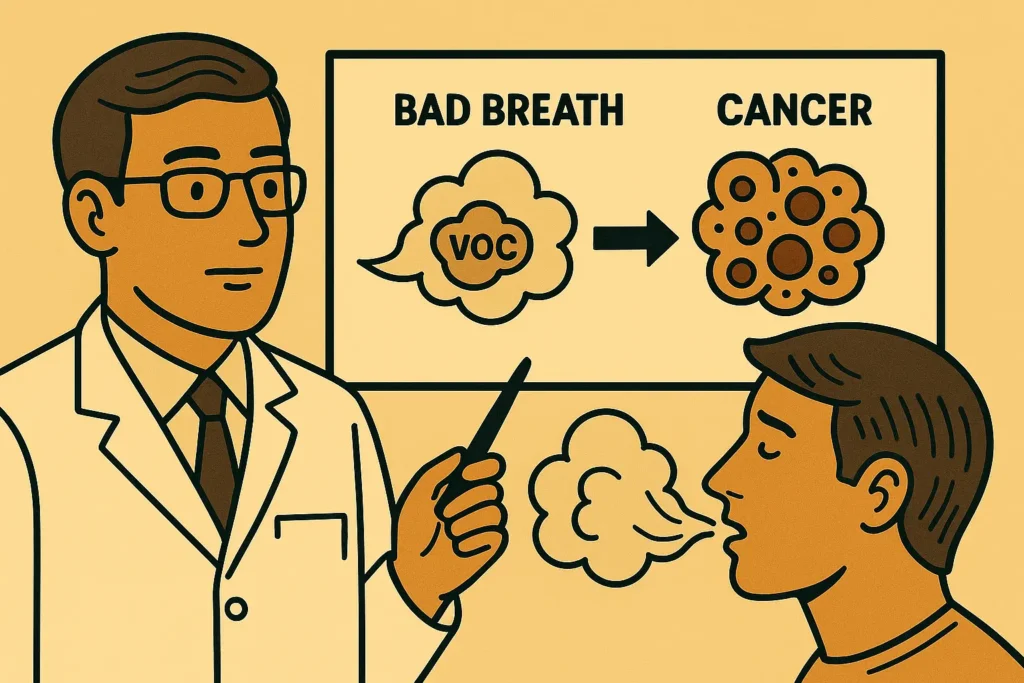Introduction
Bad breath is often dismissed as a minor nuisance, but in some cases, it may be a subtle indicator of something more serious. Certain cancers—particularly those affecting the mouth, throat, lungs, and digestive system—can produce distinct changes in breath odor. Understanding how and why cancer can cause bad breath is an important step in recognizing potential warning signs early.
The Connection Between Bad Breath and Cancer
Oral and Throat Cancers
Cancers in the oral cavity and pharynx can cause ulceration, necrosis, and secondary infections. These processes release foul-smelling compounds as tissues break down and bacterial activity increases in and around the tumor. In advanced cases, this can result in a distinctly persistent and unpleasant breath odor that does not respond to conventional treatments like brushing or mouthwash.
Metabolic Changes and Breath Chemistry
Certain cancers produce volatile organic compounds (VOCs) as part of their metabolic activity. These VOCs are released into the bloodstream and eventually exhaled through the lungs. Though not perceptible in detail by humans, this shift in breath composition reflects the underlying metabolic disruption caused by malignant growths.
Digestive Tract Cancers
Gastrointestinal cancers, particularly those in the stomach or colon, can also influence breath through systemic changes. Disruption of normal digestion, internal bleeding, or bacterial overgrowth associated with tumors can contribute to an abnormal breath odor. In these cases, the smell can be unusually sour, metallic, or reminiscent of fecal matter.
What Does Cancer Breath Smell Like?
While there’s no single, universally recognized “cancer smell,” clinicians and patients have reported distinct odors linked to specific types of cancer. These changes in breath reflect underlying metabolic shifts driven by the disease.
For example, lung cancer has been associated with a noticeably sweet or fruity breath odor, due to alterations in how the body processes and eliminates certain compounds through the lungs. Colorectal cancers, on the other hand, have been linked to a more putrid or fecal-like smell, a result of bacterial imbalance or internal tissue breakdown. In other cases, patients have described a sharp, metallic, or chemical scent.
These odors stem from volatile organic compounds (VOCs) released during cancer metabolism. While humans can only vaguely detect these changes, their presence in breath is being studied as a potential diagnostic marker. If you’re interested in a deeper breakdown of how these breath odors manifest in different cancer types, this detailed article on what cancer breath smells like offers further insight.
When to Consult a Healthcare Professional
If you experience persistent bad breath unresponsive to standard oral hygiene practices, it’s essential to consult a healthcare provider. Additional symptoms that warrant medical attention include:
- Unexplained weight loss
- Persistent mouth sores or ulcers
- Difficulty swallowing or a persistent sore throat
- Lumps in the mouth, neck, or throat
- Changes in voice or hoarseness
Early detection of a potential cancer can significantly improve treatment outcomes.
Conclusion
Persistent bad breath that cannot be resolved with routine oral hygiene may, in some cases, point to the presence of cancer. Particularly in the mouth, throat, lungs, or gastrointestinal tract. In these contexts, the odor is not due to poor hygiene, but rather to biological changes triggered by the disease itself.


